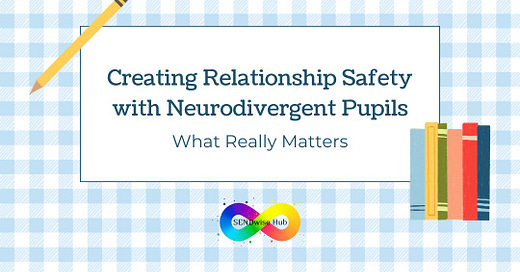For neurodivergent pupils learning cannot be separated from feeling safe. Relationship safety is the heartbeat of co-regulation, emotional security and access to learning. When neurodivergent pupils experience environments that are unpredictable, invalidating or controlling, the result is shutdown, masking, distress behaviours and disengagement. Teachers have immense power to disrupt those patterns but only if they are willing to build trust through attunement, respect and consistency.
Below are the foundations of relationship safety that every educator should prioritise as a whole approach to inclusion and connection.
1. Predictability Without Rigidity
Neurodivergent pupils rely on predictable environments to feel secure but that doesn’t mean they thrive under rigid, inflexible structures. The key is consistency with room for autonomy.
Use clear routines, visual schedules and multimodal cues to preview transitions or changes.
Give advance warning for anything out of the ordinary, even small things that might be assumed “no big deal” to others. For many pupils, even a sudden change in seating, lighting or staff presence can feel disorienting without preparation.
Predictability is safety. It is not about control but about letting pupils know they won’t be blindsided.
Why it matters: Predictability reduces anxiety and builds trust in the learning environment.
2. Respect Communication Differences
Spoken language is only one way to communicate and for many neurodivergent children, not the most comfortable or accessible one.
Teachers must actively embrace and support all forms of communication: gestures, stimming, AAC, silence, scripting, drawing, body language or echolalia (to name a few) as they are all valid, meaningful expressions.
Do not demand eye contact, tone-matching or fast verbal replies.
Honour communication on the child’s terms.
Understand that silence is not defiance. It may be self-preservation or processing time.
Why it matters: Every child has the right to communicate in a way that feels safe and accessible to them. Respecting communication differences is a direct investment in a student’s dignity and autonomy.
3. Co-Regulate, Don’t Control
When a neurodivergent pupil is dysregulated, the solution is co-regulation. Relationship safety means being with a child in their distress without trying to suppress it. It means holding space.
Model your own regulation strategies aloud and offer grounding choices like movement, quiet space or sensory tools.
Refrain from escalating with triggering language like “calm down,” “stop that,” or “use your words.” These demands increase shame and distress.
Create an environment where emotions are allowed and where the adult’s calm is a resource, not a weaponised standard.
Why it matters: Emotional safety is built when adults stay regulated and offer support, not correction or punishment.
4. Consent-Based Interactions Matter
Consent continues in the classroom.
Always ask before touching a pupil, even with good intentions.
Honour when they say “no,” need space or express discomfort.
Do not override their sensory boundaries because you assume something is harmless.
Offer choices where possible, rather than delivering orders. This builds agency and reduces oppositional dynamics.
Why it matters : Respectful, consent-based interactions lay the groundwork for relational trust and teach neurodivergent children that their body and voice belong to them.
SENDwise Hub is a reader-supported publication. To receive new posts and support my work, consider becoming a free or paid subscriber.
5. Respond to Distress with Curiosity, Not Consequences
Neurodivergent distress can look like defiance, disruption or disengagement. What looks like challenging behaviour, is a communication of unmet needs, sensory overwhelm, emotional exhaustion or trauma.
Ask: What is this child trying to tell me? What’s the unmet need here?
Investigate sensory, emotional, environmental or cognitive triggers.
Ditch the behaviour charts and punitive consequences, which punish vulnerability and neurodivergent responses.
Choose compassionate curiosity over compliance-based control.
Why it matters: Behaviour is communication. When you approach it with curiosity, you build understanding instead of shame.
6. Use Strength-Affirming Language
Words shape the way children see themselves and the way we speak to them becomes their inner monologue.
Avoid pathologising, deficit-based labels like “non-compliant,” “attention-seeking,” “lazy,” or “disrespectful” as they are harmful.
Celebrate the unique strengths and passions of neurodivergent pupils. Whether it’s pattern recognition, honesty, deep empathy, creativity, or hyperfocus, name and honour these traits.
Always presume competence and reflect progress and capability inclusive of capacity.
Why it matters: Language shapes self-worth. Speak in ways that affirm identity and accomplishments.
7. Hold Space for Authenticity
Allow your pupils to be themselves. The goal should not be assimilation but inclusion without erasure.
Let them stim, fidget, unmask, speak up, be quiet or move around as they need to. Don’t treat difference as disruption.
Celebrate self-advocacy and honest expression even when it challenges the status quo.
Never, ever shame a child in front of their peers. Public discipline destroys safety and dignity. It does nothing to build trust.
Why it matters: Relationship safety requires that pupils can be fully themselves without fear of being rejected or reprimanded.
8. Be a Safe Adult, Not Just an Authority
Neurodivergent children remember how adults made them feel. Were they safe, or scrutinised? Heard or dismissed? Repaired with or punished?
Be dependable. Be honest. Be present.
Apologise when you get it wrong. Being the adult doesn’t make you exempt.
Check in regularly, not just when something goes wrong. Let your pupils know that you’re still learning too and that their lived experience matters.
Why it matters: A safe adult makes space for trust, growth and mutual respect.
You can download this article as a free resource to share with schools below :
Final note : Safety in a relationship is the baseline for every other outcome. Without it, learning cannot be sustained, behaviour cannot be supported and identity cannot flourish. With it, everything becomes more possible: emotional regulation, communication, joy, connection and authentic growth. Relationship safety is what allows them to stop surviving and start thriving.
⭐ If you’re looking for digital and affordable resources, you can browse them here.
Brain Dump Worksheets - A space to untangle your thoughts.
Unmasking Journal - A safe place to explore who you are beneath the mask.
Decision Paralysis Survival Guide - Gentle guidance for stuck moments.
Energy Accounting Log - A mindful way to track your capacity.
Simple. Supportive. Neuro-affirming. No pressure to perform, no pathologising. Just space to be yourself, at your pace.
⭐ Last week of voting for the National Diversity Awards - click here.
A heartfelt thanks to all that have voted for me - it has been humbling and heartwarming to read all the wonderful nominations.
⭐ If you’re on any social media, come join me on Facebook, Instagram or LinkedIn.







'Respecting communication differences is a direct investment in a student’s dignity and autonomy.' YES YES YES!!!!!!